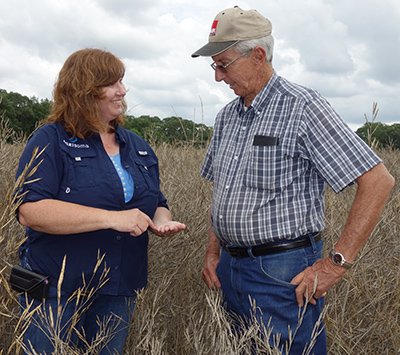Carinata Oilseed Could Take Off For Alabama Farmers

A specialty oilseed closely related to canola and used in jet fuel has landed in the fields of two Alabama farm families thanks to Canadian-based Agrisoma Biosciences Inc.
Elmore County farmer Joe Geddie first heard of carinata at the Alabama Farmers Federation’s Commodity Producers Conference in July 2016. Wheat prices were low and drought was prevalent when a conversation with Agrisoma’s Christine Bliss convinced Geddie to try 100 acres of carinata on his farm.
Joe, 80, and son Mike, 51, planted the non-food grade oilseed last fall. Their mid-June harvest averaged 30 bushels an acre.
“So far, it’s been pretty good. Maybe not a full crop but better than average,” Joe said. “We had a hard time planting it because the ground was so dry. It’s come along since then. I think dry weather at the end hurt some of the seed, but overall it’s an average crop.”
Elmore County Farmers Federation President Richard Edgar also grew carinata this year.
Heartier than canola, carinata handles environmental stresses well, such as freezing temperatures, intense heat and drought, said Bliss. It’s a winter cover crop in the Southeast but is grown in summer farther north.
“There’s a lot of acreage in the Southeast that's either fallow or people put down a cover crop they just use as fertilizer,” Bliss said. “They could use those fields to grow carinata and potentially make some income.”
Joe said modifications to plant and harvest the tiny, sprinkle-sized seeds were minimal. Little fertilizer and no herbicides were applied, and insect pressure was limited. Agrisoma personnel helped the Geddies adjust harvest equipment to minimize losses.
“We had to treat it a little bit differently,” Joe said. “Other than that, it’s about like growing wheat or anything else.”
Despite cyclical dry and rainy weather, grains stayed intact until harvest, a testament to its robust nature.
Carinata fields totaled 1,250 acres in Alabama, Florida and Georgia, with three varieties on each farm. Agrisoma looks to expand into Mississippi and Tennessee and is working with land-grant universities to cultivate best management practices and higher yields, Bliss said.
Harvested seeds are sent to a European market, and the oil is used for biojet and biodiesel fuels. The remaining seed meal is up to 45 percent protein, making it an excellent livestock supplement, Bliss said. The byproduct is approved for beef cattle feed in the U.S.
“Current approved crushing facilities for carinata oil and meal products require operations with several thousand tons of feedstock per day over a set period of time. We need acres for that,” said Agrisoma Vice President of Product Development Jeff Klingenberg, whose company has grown carinata commercially three years in Canada, the Southeast and the northern Plains. “By developing a successful cropping system and having it in place, we expect potential for new crushing facilities in the Southeast.”
Klingenberg said Agrisoma looks to grow 10,000 to 15,000 acres of carinata in Alabama this year. Crop insurance is available, with intent-to-plant applications due to the Risk Management Agency Sept. 30 before planting starts Oct. 1.
Production costs range from $225 to $285 per acre, depending on irrigation, soil health and pest management, Klingenberg said.
For the Geddies, Mike said yields will determine carinata’s place in their crop rotation, but the oilseed’s end result is appealing.
“To take that seed and then turn it into jet and diesel fuel, that’s neat,” he said.
For information, visit GrowCarinata.com or call (844) 949-2474.
